Mozambique: NGO calls for active youth participation in political dialogue
CIP Mozambique Elections: Bulletin 339

Image: CIP Eleições
- UN urges government to cease human rights violations
“UN human rights experts today [15 November] urged authorities in Mozambique to prevent and immediately stop the violence and repression of journalists, lawyers, human rights defenders and protesters and ensure those responsible are investigated and prosecuted”, the UN office of the Human Rights High Commissioner reported Friday 15 November.
and
https://news.un.org/en/story/2024/11/1157051
“The violations of the right to life, including that of a child, the deliberate killing of unarmed demonstrators and the excessive use of force by the police stationed to disperse peaceful protests in Mozambique are very disturbing”, said the Commission specialists. “We urge the Mozambican authorities to investigate promptly and impartially all the unlawful killings.”
“The authorities need to take measures to deter violence and guarantee an environment in which all Mozambicans, including women and girls, can participate fully and equally in political processes and express themselves without fear”, said the specialists.
“The agents of the law have the duty to protect and respect those who are exercising their right to peaceful assembly and the officers should remain neutral and impartial before any protest, prevent damage and protect the right to life, freedom and personal security of those involved.”
The specialists said that restrictions on media freedoms were also broadly reported, including attacks, intimidation and harassment of journalists, intermittent internet services, and blackouts of the mobile internet service. Human rights defenders who reported irregularities in the elections or took part in protests were intimidated and threatened.
“We urge the Mozambican authorities to facilitate access to information for all and we condemn the generalised interruption of Internet services which supposedly coincided with the demonstrations and marches announced”, said the specialists.
It appears no one is compiling a confirmed list of people killed in the general strike. @Verade Saturday (16 November) said that at least 84 people have been killed by police and other government forces since 21 October. In addition, @Verade reports at least nine people killed in two incidents Friday and Saturday in which a car drove intentionally into a march along the N4 road in Matola. They say several people were killed by police who came inside their houses in Luis Cabral, Matola. https://verdade.co.mz/gerais-2024-mais-cinco-cidadaos-assassinados-pela-policia-em-dia-de-panelaco-inedito-em-mocambique/ (Paywall)
CDD (Democracy and Human Rights Centre) estimated on Sunday 17 November more than 60 killed by police since the start of the demonstrations. Platforma Decide report 22 killed during the three day strike 13-15 November – 7 in Nampula, 2 in Zambézia, 9 in Maputo Province, and 4 in Maputo city.
- CDE deputy chair lynched and police HQ burned in Inhassunge
A mob lynched and murdered the Frelimo-named deputy chair of the Inhassunge District Elections Commission (CDE) on Thursday (14 November), the National Elections Commission (CNE) reported Thursday. In addition, the mob destroyed the local police command post and burned an election administration car, the CNE said.
The group went to the home of the CDE deputy chair, Luís Salimo, and dragged him outside and murdered him with a machete. The word “lynch”, dating from the US independence war and meaning a mob killing without trial, has gone into Portuguese usage as “linchar”.
- Police confirm murder as Quelimane mayor sues provincial commander
Through the head of public relations in Zambezia province, Miguel Caetano, the police in Quelimane have confirmed Wednesday (13 November) that they shot three young supposed demonstrators. The one who died of his injuries was not a demonstrator, but an adolescent who was shot while buying second hand clothing for resale. The two demonstrators shot are recovering in Quelimane Central Hospital.
The shootings occurred during a march by supporters of the Mayor of Quelimane, Manuel de Araújo. The police stopped the march, claiming that the conditions were not appropriate for it to go ahead. In confirming the shootings, the police are accepting that they used live ammunition against defenceless citizens. They also arrested 18 demonstrators.
Manuel de Araújo said that some members of the police had given him privileged information about who ordered the use of tear gas against the public on the Wednesday march. As a result, he intends to sue the provincial commander of the police and the commander of the Rapid Intervention Unit (UIR, the riot police).
- Shooting causes terror in Patrice Lumumba neighbourhood
Shots in Patrice Lumumba neighbourhood, Matola, began at around 15.00 on Wednesday 13 November, and only ceased in the early morning of 14 November.
A mass revolt began when the police fired against a young man in the zone known as Xicadjuanine. In reaction, demonstrators began to burn tyres and erect barricades on the main road into the neighbourhood. Cars were set alight, and shops looted, including a cake shop, a bottle store, a shop of the mobile phone company Vodacom, and a grocery store owned by a Burundian citizen.
On Thursday morning, the crowd attempted another demonstration and the police stopped them. The police carried out searches and arrested three youths accused of being among the possible ringleaders of the demonstrations. Two armoured cars were brought in to strengthen the police contingent in the area.
- Other demonstrations
- A young demonstrator was murdered on Thursday night (14 November) in Machava, Matola.
- In Lichinga, Niassa the police aborted a planned demonstration and fired rubber bullets to disperse the demonstrators.
- In Xai-Xai, Gaza, a peaceful demonstration when the police allowed the march.
- A proposed new flag
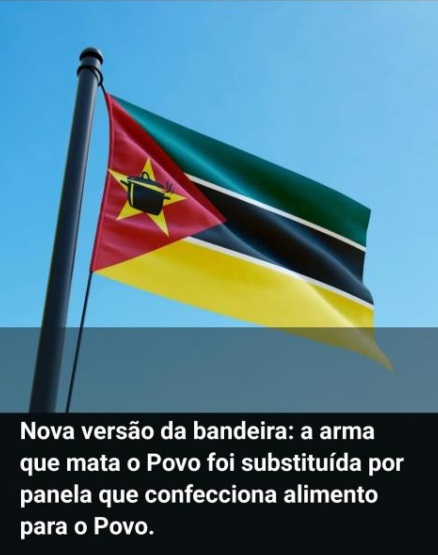
Replacing the Kalashnikov that brought independence with the beaten pan that might bring change now.
- CPLP election observers witnessed vote miscounting
CPLP observers witnessed miscounting of votes and signs that voters had voted several times “with a negative impact on the transparency and credibility of the process”, according to the final report from the Community of Portuguese Language Countries (CPLP)cited by the Portuguese news agency Lusa Friday (15 November)
The CPLP mission was headed by former Portuguese Foreign Minister João Gomes Cravinho, and that what they saw “was not favourable for the credibility of the elections”.
The CPLP mission said it noted “unequal compliance” with provisions of the electoral legislation “namely with regard to reading the sequential number of the ballot paper; the existence of more blank ballot papers than the number of voters registered at the polling station; the counting of the names struck off in the voter rolls in comparison with the number of votes in the ballot box; the locking of the voters’ list; and the posting of the minutes in a visible place in the polling station”.
The CPLP witnessed “miscounting of votes: namely, ballot papers doubled together and counted as valid, indicating that the same person had voted more than once”, and “many dozens of votes with an identical mark, indicating that the ballot papers had been marked by the same person”.
The “excessive slowness” in counting the votes and the different procedures used by the polling station chairs meant that “many hours after the close of polls the results were not available, leading to a negative perception of the transparency, and hence of the credibility of the elections”.
Among other recommendations, the CPLP mission argues that the CNE should be “more technical than political, in order to boost the trust of citizens in the neutrality of the body.”
- Frelimo election agent rang South African minister to request support
The South African Minister of International Relations, Ronald Lamola, said at a press conference Wednesday13 November that the week before, on 6 November, he had received a phone call from Verónica Macamo, Mozambican Foreign Minister and current election agent of Frelimo. She presented him with concerns about security in Mozambique and particularly at the Ressano Garcia border, after the elections of 9 October.
Verónica Macamo is in a conflict of interest because she is both Foreign Minister and the national election agent for the Frelimo Party in the most fraudulent elections in Mozambican history.
Lamola said that the guiding principles of governance of democratic elections in SADC maintain a series of norms which defend regular, free, fair and credible elections in the SADC member states. And he said that South Africa is concerned with the wave of demonstrations under way, that result in the destruction of public and private property.
SADC will hold an emergency summit Wednesday 20 November, in Zimbabwe, to analyse the situation in Mozambique. Lamola said that SADC will receive reports on the elections in Mozambique, Botswana and Mauritius.
Long term ruling parties in Botswana and Mauirtius have both been defeated in recent elections and have peacefully handed over power to the winners. Only in Mozambique is this not happening. How will SADC respond to this difference?




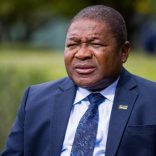
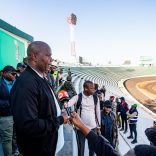
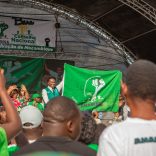
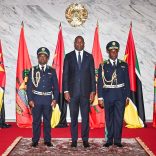




Leave a Reply
Be the First to Comment!
You must be logged in to post a comment.
You must be logged in to post a comment.